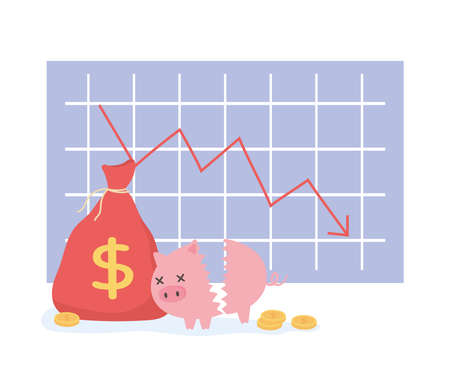1. Introduction: The Emotional Impact of Financial Uncertainty
Money plays a significant role in our daily lives, influencing everything from our basic needs to our long-term goals. When financial uncertainty arises—whether due to job loss, unexpected expenses, or economic downturns—it can take a serious toll on mental health. The stress associated with money problems can lead to anxiety, depression, and even physical health issues.
How Financial Stress Affects Mental Well-Being
When people worry about their finances, it often leads to emotional distress and decreased overall well-being. Below are some common ways financial stress impacts mental health:
| Effects of Financial Stress | Description |
|---|---|
| Anxiety & Depression | Constant worry about money can lead to feelings of hopelessness and sadness. |
| Sleep Problems | Financial concerns can make it difficult to fall asleep or stay asleep. |
| Strained Relationships | Money-related stress can cause tension between partners, family members, and friends. |
| Poor Decision-Making | Stress can cloud judgment, leading to impulsive financial choices. |
| Reduced Productivity | Worrying about money can make it harder to focus at work, affecting job performance. |
The Role of an Emergency Fund in Reducing Stress
An emergency fund is a dedicated savings account designed to cover unexpected expenses like medical bills, car repairs, or sudden job loss. By having money set aside for these situations, individuals can feel more secure and avoid the panic that comes with financial emergencies.
(1) Provides Peace of Mind
Knowing you have a financial cushion reduces anxiety and allows you to handle challenges with confidence.
(2) Prevents Debt Accumulation
An emergency fund helps prevent reliance on credit cards or loans, which can lead to long-term debt and additional stress.
(3) Improves Decision-Making
With financial security in place, people can make better decisions without the pressure of immediate financial concerns.
2. Peace of Mind: Reducing Anxiety with Financial Preparedness
Having an emergency fund isn’t just about being financially responsible—it’s also about ensuring peace of mind. Knowing that you have money set aside for unexpected expenses can significantly reduce stress and anxiety in your daily life. Without the constant worry of how to cover sudden costs, you can focus on other important aspects of your life, such as career growth, family, and personal well-being.
How an Emergency Fund Provides a Sense of Security
When you have a financial cushion, you’re better equipped to handle life’s uncertainties. Whether it’s a medical emergency, job loss, or urgent home repair, an emergency fund ensures that you don’t have to rely on credit cards or loans to get through tough times. This financial preparedness allows you to feel more secure and in control.
Key Ways an Emergency Fund Reduces Stress
| Financial Concern | How an Emergency Fund Helps |
|---|---|
| Unexpected Medical Bills | Covers out-of-pocket costs without disrupting your budget. |
| Job Loss | Provides a buffer while searching for new employment. |
| Car or Home Repairs | Avoids reliance on high-interest loans or credit cards. |
| Family Emergencies | Allows flexibility to travel or assist loved ones in need. |
(1) Reducing Daily Financial Worries
An emergency fund minimizes the stress of living paycheck to paycheck. Instead of feeling overwhelmed by potential financial setbacks, you can approach challenges with confidence, knowing that you have resources available when needed.
(2) Encouraging Better Financial Habits
Building and maintaining an emergency fund fosters responsible money management. It encourages saving discipline and reduces impulsive spending since you become more aware of your financial priorities.

3. Improved Decision-Making: Avoiding Panic Responses in Emergencies
Having an emergency fund not only provides financial security but also helps you make better decisions during unexpected crises. When youre financially prepared, youre less likely to react out of fear or desperation. Instead, you can assess the situation rationally and choose the best course of action without feeling pressured.
How Financial Preparedness Leads to Better Choices
In times of financial stress, panic can lead to poor decision-making. Without savings, people may resort to high-interest loans, sell valuable assets at a loss, or make rushed choices that negatively impact their long-term stability. An emergency fund allows you to:
- Avoid High-Interest Debt: Without savings, you may have to rely on credit cards or payday loans, which come with high interest rates.
- Make Thoughtful Career Decisions: If you lose your job, having a financial cushion gives you time to find the right opportunity instead of accepting the first available option out of necessity.
- Handle Medical Emergencies Wisely: Rather than delaying necessary medical care due to financial concerns, an emergency fund enables you to prioritize health without added stress.
The Impact of Panic-Based vs. Rational Decision-Making
The table below highlights the differences between decisions made under financial distress versus those made with the security of an emergency fund:
| Situation | Panic-Based Decision (No Emergency Fund) | Rational Decision (With Emergency Fund) |
|---|---|---|
| Job Loss | Accepts any job immediately, even if its a poor fit or low-paying. | Takes time to find a suitable job that aligns with career goals. |
| Unexpected Medical Expense | Avoids treatment or delays care due to cost concerns. | Pays for necessary treatment without financial strain. |
| Car Breakdown | Takes out a high-interest loan or buys a low-quality replacement vehicle. | Covers repairs or purchases a reliable car without debt. |
| Sudden Home Repair | Puts off repair, leading to further damage and higher costs later. | Pays for immediate repairs, preventing additional expenses. |
The Psychological Relief of Financial Readiness
The peace of mind that comes with knowing you have savings set aside cannot be overstated. Instead of feeling overwhelmed when emergencies arise, you can approach challenges with confidence and control. This mental clarity allows you to weigh options carefully and make informed choices that benefit your long-term well-being.
4. Greater Financial Confidence: Enhancing Stability and Long-Term Planning
Having an emergency fund not only provides a financial safety net but also boosts confidence in managing money effectively. Instead of constantly worrying about unexpected expenses, individuals with savings can focus on building a stable financial future.
How an Emergency Fund Increases Financial Confidence
When you have a dedicated emergency fund, you experience less financial anxiety and gain the ability to make smarter decisions about your future. Here’s how:
(1) Reduced Fear of the Unknown
Unexpected expenses—such as medical bills or car repairs—can be stressful. However, knowing you have savings set aside reduces uncertainty and allows you to handle challenges with confidence.
(2) Ability to Plan for Long-Term Goals
Without the burden of short-term financial stress, you can shift your focus to bigger goals, such as buying a home, investing, or planning for retirement. This creates a more secure financial path.
(3) Increased Control Over Financial Decisions
Financial independence comes from having choices. An emergency fund ensures that youre not forced into high-interest debt or rushed financial decisions when unexpected costs arise.
Emergency Fund Impact on Financial Stability
The following table highlights key differences between individuals with and without an emergency fund:
| With an Emergency Fund | Without an Emergency Fund |
|---|---|
| Confident in handling unexpected expenses | Constant worry about financial emergencies |
| Able to focus on long-term goals | Stuck in short-term survival mode |
| Reduced reliance on credit cards or loans | More likely to accumulate debt |
| Greater sense of financial independence | Limited control over financial decisions |
Steps to Strengthen Financial Confidence Through Savings
(1) Set a Realistic Savings Goal
Start by determining how much you need in your emergency fund based on your monthly expenses and lifestyle.
(2) Automate Your Savings
Setting up automatic transfers to your emergency fund ensures consistent contributions without requiring extra effort.
(3) Avoid Using the Fund for Non-Emergencies
Reserve this money strictly for urgent situations to maintain its intended purpose.
(4) Review and Adjust Regularly
Your needs may change over time, so periodically reassess your savings goal and adjust contributions accordingly.
An emergency fund provides not just financial security but also peace of mind, allowing you to plan ahead with confidence instead of reacting out of fear. By taking proactive steps toward building this safety net, you gain greater control over both present stability and future aspirations.
5. Conclusion: Building an Emergency Fund for a Stress-Free Future
Having an emergency fund isn’t just about financial security—it’s also about peace of mind. When you know you have a safety net, unexpected expenses don’t feel like disasters. Instead, they become manageable situations that you can handle with confidence.
How an Emergency Fund Reduces Stress
Financial uncertainty is one of the biggest sources of stress for many people. By setting aside savings, you gain:
- Peace of Mind: Knowing that youre prepared for emergencies reduces anxiety.
- Better Decision-Making: Without the pressure of immediate financial strain, you can make more rational choices.
- Improved Mental Health: Less stress means better overall well-being and fewer sleepless nights.
Steps to Start Your Emergency Fund
Building an emergency fund doesn’t have to be overwhelming. Here’s how you can get started:
(1) Set a Realistic Goal
Aim to save at least three to six months’ worth of essential expenses. If that seems daunting, start small—every dollar counts!
(2) Create a Budget That Works
Find areas where you can cut back on spending and redirect those savings into your emergency fund.
(3) Automate Your Savings
Set up automatic transfers to your savings account so you don’t have to think about it.
(4) Keep It Accessible but Separate
Your emergency fund should be easy to access in a crisis but separate from your everyday checking account to avoid temptation.
Emergency Fund Savings Milestones
Here’s a simple breakdown of savings goals based on different stages:
| Savings Milestone | Goal Amount | Benefit |
|---|---|---|
| Starter Fund | $500 – $1,000 | Covers small unexpected expenses like car repairs or medical bills. |
| Basic Security | One month’s living expenses | Cushions against short-term financial disruptions. |
| Comfortable Safety Net | Three to six months’ living expenses | Provides strong financial security during job loss or major emergencies. |
| Long-Term Stability | Six months or more of living expenses | Ensures peace of mind and greater flexibility in financial planning. |
The First Step Starts Today
No matter where you are in your financial journey, taking the first step toward building an emergency fund will set you up for a more secure and stress-free future. Start small, stay consistent, and watch your financial confidence grow!


